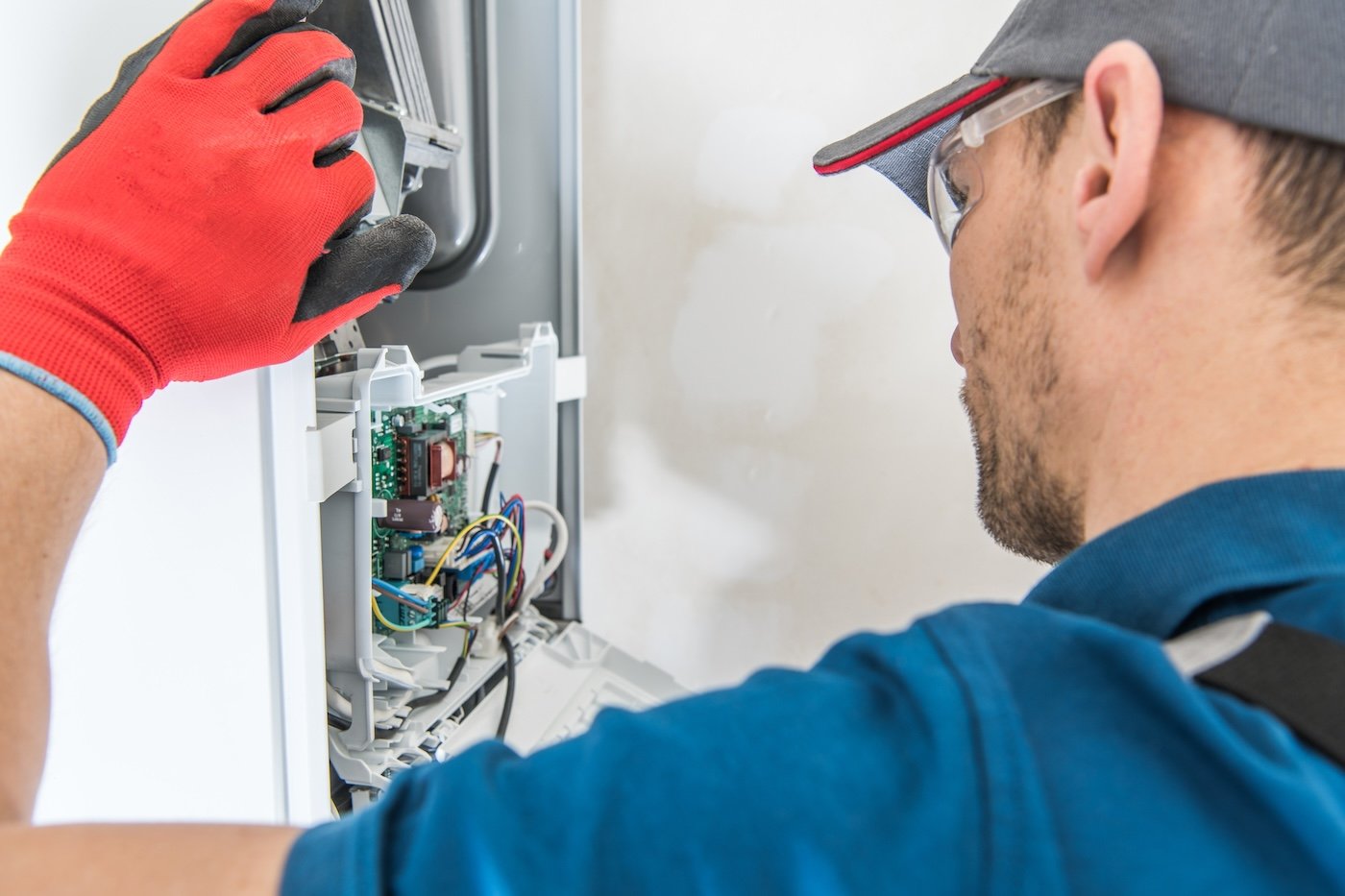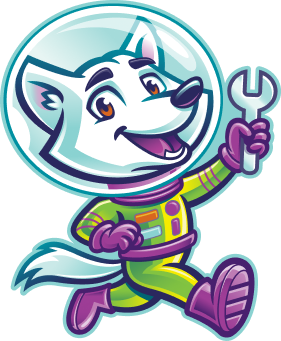
Heat Pump Repair Guide (5 Common Problems & Fixes)
6/02/25
8 Minute Read
Heat pumps are a fantastic solution for energy-efficient home heating and cooling. But like any HVAC system, they aren’t immune to occasional hiccups. Understanding common heat pump problems and how to address them can save you stress, money, and discomfort when something goes wrong. This guide will walk you through:
- How heat pumps work and why they’re unique
- 5 common heat pump repairs from common heat pump problems
- Signs it’s time to call a repair professional
👉 How Heat Pumps Work

Heat pumps are an innovative alternative to traditional heating and cooling systems. Unlike furnaces or air conditioners that generate heat or cool air, heat pumps transfer heat. They extract heat from the air or ground and move it either inside to warm your home or outside to cool it. This process makes them incredibly energy-efficient and versatile.
Because of their unique design, heat pumps offer several benefits:
- Energy Efficiency: By transferring heat rather than generating it, heat pumps use significantly less energy.
- Eco-Friendly Operation: Lower energy usage means reduced carbon emissions, making them a sustainable choice.
- Dual Functionality: Heat pumps can both heat and cool your home, eliminating the need for separate systems.
However, their specialized mechanism can sometimes require unique maintenance and repair solutions. Regular maintenance, such as cleaning filters, checking refrigerant levels, and inspecting the outdoor unit, can help ensure your heat pump runs smoothly and efficiently. Understanding these basics can prevent costly repairs and extend your system’s lifespan.
❗️ 5 Common Problems with Heat Pumps (and How to Fix Them)

Heat pumps are dependable and efficient systems for both heating and cooling your home, but just like any other appliance, they can encounter issues over time. Understanding these problems and knowing how to address them can help you maintain the system’s performance and extend its lifespan. Below are five common heat pump problems, along with detailed solutions to fix them.
1. Heat Pump Not Turning On
One of the most frustrating issues you can face is when your heat pump simply refuses to start. This can often be traced back to electrical problems, including blown fuses or tripped breakers, which cut off the power supply to the unit. Another common culprit is a malfunctioning thermostat. The thermostat might have dead batteries, incorrect temperature settings, or may simply be defective. Internal electrical issues, such as faulty wiring or damaged components within the heat pump, can also prevent it from turning on.
To resolve this, begin by checking your thermostat’s settings. Ensure that it’s set to heating or cooling mode as needed and that the temperature setting is appropriate for the room. Replace the batteries if they are dead, as this is often a simple fix. Next, inspect your circuit breaker and fuse box to make sure power is being delivered to the heat pump. If you find a tripped breaker, reset it, but if the breaker keeps tripping, you may need to investigate further. If these steps don’t solve the problem, it’s best to call a professional technician. They can perform a full system inspection to detect any electrical malfunctions or internal component failures.
2. Insufficient Heating or Cooling
If your heat pump is running but the airflow feels weak or it’s not reaching the desired temperature, you may be dealing with a range of underlying problems. One of the most common causes is a clogged air filter. Over time, filters can become blocked with dust, dirt, and debris, which restricts airflow and reduces the system’s efficiency. Another potential issue is a refrigerant leak. Refrigerant is essential for heat transfer, and a leak can prevent the heat pump from effectively cooling or heating your home. Additionally, dirty coils in the outdoor or indoor unit can hinder heat exchange, leading to decreased performance.
To fix this issue, start by replacing or cleaning your air filters regularly. A clean filter allows for proper airflow and helps the system operate efficiently. If you suspect a refrigerant leak, call an HVAC professional immediately. Refrigerant is a hazardous substance and handling leaks requires specialized training and equipment. Dirty coils can also be addressed through routine maintenance. Schedule professional servicing to ensure the coils are cleaned properly, as this will improve the heat pump’s performance and energy efficiency.
3. Heat Pump Running Constantly
A heat pump that seems to run all the time, even when it’s not particularly cold outside, can be another indication of a problem. This issue may occur due to extremely cold outdoor temperatures, which can push the system to work harder to maintain the desired indoor temperature. In such cases, supplemental heating may be required. However, if the heat pump runs non-stop even in milder conditions, it could point to thermostat issues. The thermostat might be set too high or may struggle to register when the desired temperature has been reached. In some cases, damaged components such as a stuck relay or frozen coils could be causing the system to overwork.
To address this, start by checking your thermostat settings and adjusting them to more realistic levels if needed. This can prevent the system from overexerting itself. If outdoor temperatures are freezing, inspect the outdoor unit for ice buildup. If frost or ice is present, gently remove it to ensure proper airflow and operation. Persistent problems, such as a stuck relay or damaged motor, should be handled by a professional technician. They can troubleshoot the system to identify and repair any malfunctioning components.
4. Strange Noises
While heat pumps are generally quiet, unusual noises like grinding, rattling, or banging can be a sign of trouble. These sounds often indicate specific issues. Grinding noises might suggest motor or bearing problems, which can worsen if left unaddressed. Rattling noises could be caused by loose components within the system, while banging may indicate that debris has become lodged in the outdoor unit.
If you hear strange noises, the first step is to turn off your heat pump and inspect the unit for visible debris or loose parts. Clear out any debris carefully to avoid further damage. You can also tighten any screws or bolts on the exterior of the unit to prevent unnecessary vibrations. However, if the noise persists or seems to come from internal components, it’s best to call a professional. An experienced technician can diagnose the issue and perform the necessary repairs to keep your heat pump running smoothly.
5. Refrigerant Leaks
Refrigerant is vital to the operation of a heat pump, as it facilitates the transfer of heat in and out of your home. When refrigerant leaks occur, the system’s ability to heat or cool efficiently is compromised. Signs of a refrigerant leak can include poor temperature control, ice forming on the outdoor unit, and hissing or bubbling sounds near the heat pump. A low refrigerant level not only affects performance but can also put additional strain on the system, leading to potential damage over time.
If you suspect a refrigerant leak, it’s critical to contact a professional immediately. Refrigerant handling requires specialized tools and certifications to ensure safety. A technician can locate the source of the leak, repair it, and recharge the system with the appropriate amount of refrigerant. To prevent future leaks, schedule regular maintenance for your heat pump. Routine servicing helps identify potential refrigerant issues early, ensuring the system remains efficient and safe to use.
👨🔧 When to Call a Heat Pump Repair Specialist

Knowing when to call a heat pump repair specialist is essential for maintaining your system’s longevity. While homeowners can handle minor tasks like changing filters or clearing debris, certain issues require the expertise of a professional.
For example, if your heat pump cycles on and off too frequently (a problem known as short cycling) or if there’s little to no airflow even after cleaning the filter, it’s time to seek help. Unusual odors coming from the unit or unexplained spikes in your energy bills are also common signs that something isn’t right. Additionally, if your DIY efforts haven’t resolved the issue, it’s best to leave it to the experts.
In any of these cases, you can count on Nebula Home Services. Our experienced technicians are ready to diagnose and repair even the toughest heat pump problems quickly and efficiently.
🙌 Stay Comfortable Year-Round with Expert Heat Pump Repairs from Nebula Home Services!
At Nebula Home Services, we pride ourselves on delivering reliable, high-quality heat pump repair services that you can count on. Our certified technicians bring years of experience, ensuring that every job is done efficiently and correctly the first time. We are committed to your comfort, offering prompt response times, transparent pricing, and exceptional customer service. When it comes to maintaining or repairing your heat pump, trust the team that prioritizes your needs and satisfaction above all else. Contact Nebula Home Services today to schedule your repair and keep your home comfortable year-round!


